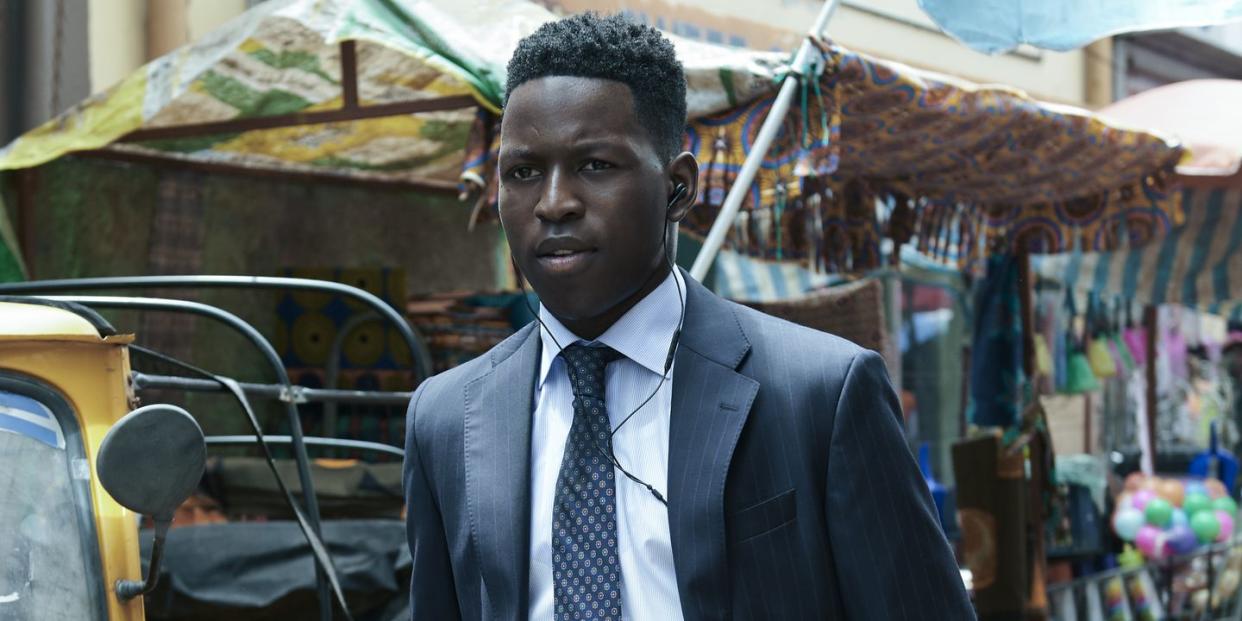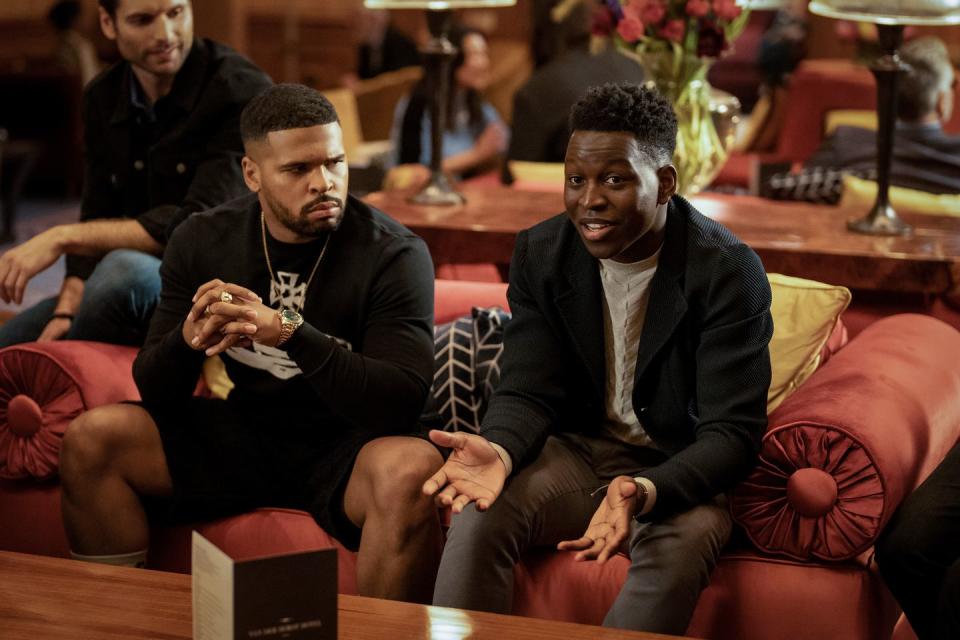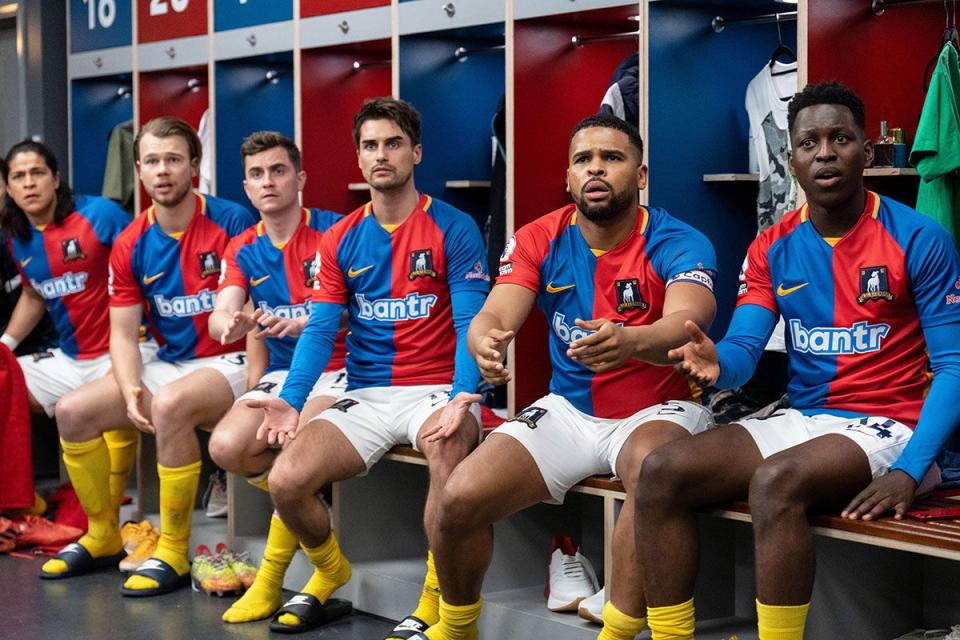Exclusive: Toheeb Jimoh talks toxic masculinity in Ted Lasso and The Power

- Oops!Something went wrong.Please try again later.
- Oops!Something went wrong.Please try again later.
We're being treated to double billing of Toheeb Jimoh this spring, as he takes on the role of Nigerian journalist Tunde in The Power alongside his endearing turn as Sam Obisanya on Ted Lasso.
Jimoh stars as one of the few male characters in the Prime Video show The Power, among a cast of women reckoning with their sudden ability to shoot bolts of electricity from their fingertips like Spiderman's webs.
The show is based on Naomi Alderman’s sci-fi novel of the same name, which was one of those books everyone on the tube was reading when it first hit shelves in 2016, and attempts to answer the age-old question: what would happen if women ran the world?
While Beyoncé might think we already do, The Power positions a sudden superpower as the means by which the patriarchy could be truly upended. Jimoh's character Tunde takes it upon himself to document how this newfound power among women and girls, called Electric Organ Discharge (EOD), ripples through society.
"He's trying to come to terms with his own lived experiences and his own privileges," Jimoh told Digital Spy, describing Tunde's journey as one of allyship. However, he admitted that his character's utopian hopes of EOD unlatching a new world of true gender equality turn out to be naïve.
While The Power is a story of female empowerment, Jimoh said it also explores how this authority shift affects everyone: "The world is forcing all of the men to re-examine what their relationship is with power, with women, and Tunde's doing the same thing."
Yet Tunde stands apart from many of the male characters around him, who see EOD as a threat and something to be fearful of, prompting violent patriarchal crackdown on women's use of their sizzling digits in a recent episode.
While The Power seems to be a sharp right turn from the grassy pitches of Richmond FC and its Bantr-emblazoned football kits, Jimoh recognises its link to Ted Lasso in looking at masculinity – albeit in vastly different ways.

Seen as one of the rare, good things to emerge amid the two-ish years of the coronavirus pandemic, Ted Lasso's fuzzy Premier League Lite managed to boost serotonin levels like a ray of sunshine after the depths of winter.
Not only that, the show has been peppered with Emmy Awards, a Peabody Award for "offering the perfect counter to the enduring prevalence of toxic masculinity, both on-screen and off" and last month, Jimoh was among the cast members invited to the White House to promote mental-health awareness.
From the first season, Ted Lasso presented an antidote to toxic masculinity, with memorable exchanges like Ted (Jason Sudeikis) telling the team: "Y'all got to get together and woman up." A surly Jamie Tartt (Phil Dunster) replied: "I think you mean man up, mate," to which Ted zinged back: "No, y'all been manning up for a while. Look where that's got you."
Elsewhere, Ted has described Jimoh's character Sam as "more open than the jar of peanut butter on my counter", again touching on how the show has looked to dismantle macho stereotypes, particularly around men in sport. It is instead sprinkled with dialogue that regularly references romantic comedies and encouraging fellow teammates to be frank with their feelings.

Jimoh's filming schedule required him to bounce between the yin and yang worlds of The Power's brutal patriarchy and Ted Lasso's antidote to toxic masculinity. "So much of Ted Lasso is about how masculinity is portrayed and what it should be and how it can operate and The Power is the complete opposite," he said.
Being able to play sweet and principled Sam as well as determined and wide-eyed Tunde gave Jimoh an opportunity to "scratch different itches" but also stressed how influenced one can be by the world around you.
Whether it's in his warm and winning locker room with his Labrador team mates or as a burgeoning restauranteur on Richmond's culinary scene, Sam is in a "really safe space" on Ted Lasso. "Sam is in this environment with people he considers family," Jimoh said. "We're seeing how he gets to grow because of that and the type of man that he's turning into because of that."
On the other hand, Tunde is at the epicentre of a revolutionary storm in The Power, most recently witnessing grim violence against Saudi Arabian women who were protesting for their rights after the onset of EOD. "It's like he's in a really harrowing space," said Jimoh. "A lot of the time he's in really dangerous situations and we're seeing how his outlook of the world is slowly starting to change because of it."
"These people are turning into different people just because of the worlds that they grew up in," Jimoh added of both characters. "The Power and Ted Lasso are both speaking about how masculinity affects all of us and how important men are in the worlds that we grow up in because of the positions of privilege that they're in."
While he remained relatively buttoned up about his character's upcoming storyline, he did ominously say The Power gets "deeper, darker and doubles down on the themes", implying Tunde could be heading for a Nate Shelley (Nick Mohammed)-style turn to the dark side.
Jimoh ultimately stressed how important it has been to be involved in shows like Ted Lasso and The Power, where a deep dive into human nature is embedded in the drama: "I just always wanted to be in the space telling stories that can affect change in the world that we're in. So, I've had a fun time doing that."
The Power is available on Prime Video, while Ted Lasso season 3 is streaming now on Apple TV+.
You Might Also Like

